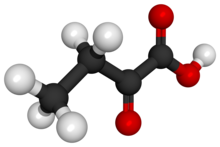α-Ketobutyric acid is an organic compound with the formula CH3CH2C(O)CO2H. It is a colorless solid that melts just above room temperature. Its conjugate base α-ketobutyrate is the predominant form found in nature (near neutral pH). It results from the lysis of cystathionine. It is also one of the degradation products of threonine, produced by the catabolism of the amino acid by threonine dehydratase. It is also produced by the degradation of homocysteine and the metabolism of methionine.
 | |
 | |
| Names | |
|---|---|
| Preferred IUPAC name
2-Oxobutanoic acid | |
| Identifiers | |
3D model (JSmol)
|
|
| ChEBI | |
| ChEMBL | |
| ChemSpider | |
| DrugBank | |
| ECHA InfoCard | 100.009.080 |
| EC Number |
|
| KEGG | |
| MeSH | Alpha-ketobutyric+acid |
PubChem CID
|
|
| UNII | |
CompTox Dashboard (EPA)
|
|
| |
| |
| Properties | |
| C4H6O3 | |
| Molar mass | 102.089 g/mol |
| Appearance | colorless solid |
| Melting point | 33 °C (91 °F; 306 K) |
Except where otherwise noted, data are given for materials in their standard state (at 25 °C [77 °F], 100 kPa).
| |
α-Ketobutyrate is transported into the mitochondrial matrix, where it is converted to propionyl-CoA by branched-chain alpha-keto acid dehydrogenase complex. Further mitochondrial reactions produce succinyl-CoA. This is first through the enzyme mitochondria propionyl-CoA carboxylase with biotin as a cofactor to produce (S)-methylmalonyl-CoA. This is subsequently converted to (R)-methylmalonyl-CoA by mitochondrial methylmalonyl-CoA epimerase. Finally, mitochondrial methylmalonyl-CoA mutase with cofactor adenosylcobalamin produces succinyl-CoA which enters the citric acid cycle.[1]
Conversion in sotolon in French vin jaune
editVin jaune is marked by the formation of sotolon from alpha-ketobutyric acid.[2][3]
See also
edit- Butyric acid
- α-Aminobutyric acid (homoalanine)
- 2-Hydroxybutyric acid (α-hydroxybutyric acid)
- Other oxobutanoic acids
- 3-Oxobutanoic acid (acetoacetic acid)
- 4-Oxobutanoic acid (succinic semialdehyde)
References
edit- ^ http://smpdb.ca/ [not specific enough to verify]
- ^ Pham TT, Guichard E, Schlich P, Charpentier C (1995). "Optimal Conditions for the Formation of Sotolon from α-Ketobutyric Acid in the French 'Vin Jaune'". Journal of Agricultural and Food Chemistry. 43 (10): 2616–2619. doi:10.1021/jf00058a012.
- ^ Guichard E, Pham TT, Etievant P (1993). "Quantitative Determination of Sotolon in Wines by High-Performance Liquid Chromatography". Chromatographia. 37 (9–10): 539–542. doi:10.1007/BF02275793. S2CID 95494741.